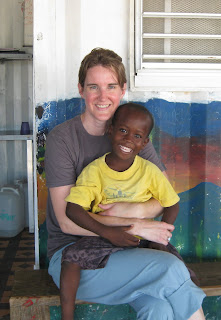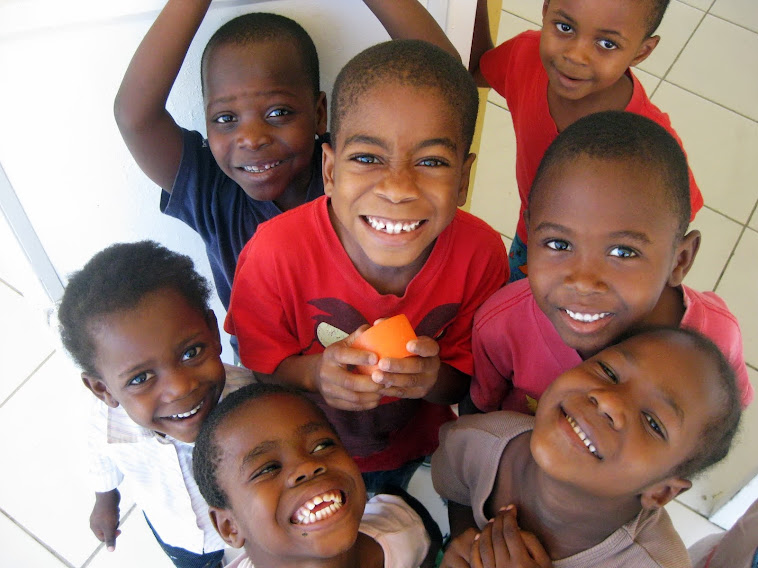It's hard to know where to start tonight. This past week has been full, as I imagine they all will be in their own way. I am back in my guest house, returning from a glorious weekend away at the beach with other volunteers, generously covered by the NPFS programs. There is a torrential downpour outside, with lightning flashes and thunder claps closer than I have experienced before! When the rain pounds down onto my roof, I cannot hear anything else at all.
This was my first week on my own at the clinic, and I was blessed to work with cooperative nurses. Despite a still very evident language barrier, we were able to organize all of the charts at St. Louis into alphabetical order and place new forms into them. It was hard to tell who was more determined – me or them! They are willing to give input and share their opinions, which is encouraging to me. This is their country, their clinic, and I am a new foreigner who comes in and is there to assist in improvements. So I appreciate their comfort and am hoping that a trusting relationship continues to develop. I have been observing their practice and can see some significant differences – not terrifically bad or good – just differences. Gauging when to treat a fever, their approach and materials used in wound care, medications dispensed for different conditions, prevalence of certain conditions – it is a different culture here, and the approach seems very classic. As we sorted through all of the “dossiers,” we discovered some significant issues for which there had been no follow-up in several months. It was a great reassurance to bring these to the doctor's attention and have them addressed immediately. She is delightful and now asks me with a smile each time she comes to the clinic, “Should I speak in French today, or still in Spanish?” My request has been for Spanish, but I hope to soon change that! There were moments each day that were overwhelming – the sheer number of children needing the completion of examinations to bring their charts current, the amount of education that is needed for the staffs of the clinic and the homes, the constant heat, which blankets us in humidity and stillness, the desperate need for love present in the many little faces which peek in on me every day, the choice to be patient with the system, which takes days to return blood work and requires a CD from us for each x-ray, viewing results which need attention and knowing that a part-time physician will not see those results for several more days, the inability to quickly move from St. Louis to Ste. Anne, which is located many minutes' drive away, and the daunting language challenge.
 |
| the clinic container |
 |
| the other side, with beds for the sick kiddos |
 |
| The medications - a lockable cupboard is being built!! |
 |
| One of many murals that are painted on the containers |
 |
| watering the flowers and the grass! |
I find humor in the midst of the days, though. It turns out that both of the nurses in the clinic absolutely love to listen to the Haitian radio evangelist shows which are hours on end of preaching, intensity of phone calls and altar calls, testimonials and intermittent praise songs. A note on the phone calls – apparently no one calling in knows to turn down/off the radio when they are calling in to a radio station, so all we would hear for hours was loud feedback. Unfortunately though, intense, spirit-filled preaching is not a great way for me to learn the Creole because it is shouted and spoken so rapidly! There are a few hours of relief in the mornings when pop music is played. Popular artists include Michael Jackson, Celine Dion, numerous 80's bands whose songs are covered in Creole... The kids now love to come to the clinic door and shout my name just to see what my reaction will be. They play hand games for hours on end and can be entertained by the simplest things! But they have now begun requesting things from me, such as English books, cars and other toys. Some of the kids still can't say my name, and call me “Veeseete.” Almost, but not quite!
I make a trek of about ½ mile from my house to St. Louis twice a day. I leave in the morning around 8 am, and return from St. Louis back to the hospital around 12:30 in order to have lunch at the common volunteer tent. I then return to St. Louis by 2 pm and work until 4 pm. The walk is both refreshing and a bit challenging. The SUN is out from before 6 am until 6 or 6:30 pm, so it is already blazing hot by the time I head out the hospital gate. The cat-calls start almost immediately – there is simply no way I will blend in here. Just not gonna happen. So the whistles, comments in broken English and attempts to get my attention with whatever phrase can be thought up are trying, but I just make eye contact and say, “Bonju,” (good morning), or “Bonswa” (good afternoon), or ignore them altogether on the external front. Adults and children approach me and beg for food or other items; such is the culture of dependency which is present here, thanks to numerous organizations and people who give handouts, and naïve travelers who flaunt their money.
Internally it is very challenging for me to walk the short path to work, because the blatant poverty surrounds me: the trash is everywhere, on the road and in the fields, the now-torn and nearly ruined tents still house thousands of citizens, collapsed structures remain untouched in countless neighborhoods, the childrens' cries constantly echo from the hospital windows; death is always close by - the vast majority of the people survive day-to-day by the grace of God, and He has not given up hope. My mind churns as I walk and observe and treat and teach and sort and eat and absorb and process. How can a country so long entombed in poverty, corruption, abuse, foreign rule, and disaster after disaster ever hope for recovery? It would be easy to just give up, despair and say there is nothing even the greatest effort could affect. And yet we are driven to continue our feeble work. I feel impelled to be here – by a Spirit much stronger than my own. There have been numerous moments in just the first two weeks of a year-long commitment when I could have chosen to run back to the airport, get back on a plane and try to recover my once familiar life in the States. But that all seems very far away now. THIS is my life. The sweat, mosquito bites, loneliness, fear, simplicity, the daily sacrifice of my comfort for the chance that when one life is changed, that the whole world is changed. And it is worth every bit of that fleeting materialism when I hear the sweet attempts at my name, when I am overtaken by hugs, when the nurses laugh, when the music plays, when the mass is sung, when the dead of the hospital are annointed, when I see the joy present in little faces whose owners are being given security, stability, safety, education, love, nutrition, health, and the chance to contribute a positive future to a country that so needs them.
 |
| soo precious! |
 |
| Loubens, center, and Stanley, right, with another friend. | |
|
|
 |
| Stanley, my sunshine. Always smiling! |
 |
| the three of us nurses |
My three-day weekend began in the most sober of ways. I attended my first daily mass at 7 am. Mass is held every morning while Fr. Rick is here. It has become the custom to memorialize the dead from the previous day at mass. So it is never known how many bodies will be present. Friday morning there were five. Two adults, from St. Luke/Ste. Philomen (the adult hospital and cholera treatment center), and three children. One of the kids was a heart-breaker for me – a cardiology patient, who had been sent to the States last year for surgery. He had significant complications, became severely ill, and before a good investigation could be done, he passed away. A three-year old boy and a brand new baby were also among the dead. Mass was reverent, the dead were annointed and prayed over, then after mass there was a procession with the bodies, back to the corner of the hospital property where there is a morgue and a crematorium. We were asked to assist in carrying the bodies, as there were many and they are heavy. So we slowly processed around the hospital, singing and carrying the dead. How routinely this is done, how death is not fought, how almost expected it is, how stoic the families are, how foreign this is to American culture. There seems to be often an underlying resignation here. So different. The expression of emotion is rather frowned upon as a cultural norm. Not that it is not done, but that stoicism, even among children, is encouraged.
Shortly after the mass/funeral, we departed for our weekend at the beach. In order to get there, we drove through one of the most devastated slums in the world, Cite Soleil, famous for its danger and extreme poverty. NPH Haiti is building a hospital there, right on the beach. The sisters of Charity operate a clinic there, which I have been invited to attend soon by one of the nuns here. She calls it “Calcutta in Haiti.” We cleared the city, driving through flooded streets and battling with tap-taps through crowded intersections, and drove past “Canaan,” the extreme suburbs where residents of Port-au-Prince were paid to move by some NGO's, then left with no access to anything. Tiny shacks made of wood populate sun-scorched fields, at completely random locations. There is no water, local market, health care or anything around. The forethought and long-term commitment was either absent or financially removed by the planners. Many residents have abandoned the land they were given and have moved back to PAP – where, I don't know.
After two hours, we finally arrived at a beautiful resort, air-conditioning, hot showers, amazing buffet, gorgeous pool and beach. It was both welcomed and strange for me – to be spending a weekend relaxing, enjoying the beauty of Haiti, all the while knowing the terror and insecurity being lived by millions around me. It's a challenge I will likely experience again. But WOW. The island is stunning – mountains, beaches, the color of the water, good food, good company. Just what was needed after an intense two weeks. The return to reality came too soon, but it was still good to arrive back at “my house” and re-enter the routine which is still in development. Uncertainty is everywhere, the people are restless and patience is waning. But the children still sing and dance, and the women still smile when they are greeted on the street. We march toward a future we do not understand yet, but we know it is coming and we actively pursue it. There is no other option.










No comments:
Post a Comment